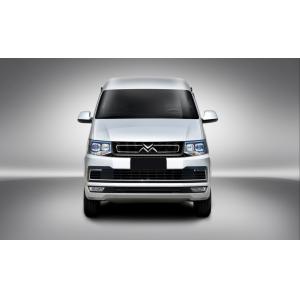

Add to Cart
Driving and Handling:
Gasoline mini buses are designed to provide a comfortable and
stable ride for both passengers and the driver. They are equipped
with features such as power steering, independent suspension
systems, and anti-roll bars to enhance handling and stability on
the road. The driver's seat is positioned to provide good
visibility, and controls are ergonomically placed for ease of
operation.
Emissions and Environmental Impact:
Gasoline mini buses, like all gasoline-powered vehicles, emit
exhaust gases during operation. While efforts have been made to
improve engine efficiency and reduce emissions, these vehicles
still contribute to air pollution and carbon emissions. In
environmentally conscious regions, there is a growing shift toward
alternative fuel options such as electric or hybrid mini buses to
reduce the environmental impact.
Regulations and Safety Standards:
Gasoline mini buses are subject to regulations and safety standards
that vary by country and region. These standards encompass aspects
like crashworthiness, occupant protection, fire safety, and
emission regulations. Manufacturers ensure compliance with these
standards during the production of mini buses to provide a safe and
reliable transportation option.
Cost Considerations:
Gasoline mini buses typically have a lower purchase cost compared
to larger buses, making them a more affordable option for
organizations or individuals needing transportation for smaller
groups. However, it's important to consider factors beyond the
initial purchase price, such as fuel costs, maintenance expenses,
insurance, and resale value, to evaluate the overall cost of
ownership.
Interior Space and Versatility: Gasoline passenger cars come in
various sizes and body types, providing different levels of
interior space and versatility. Compact cars are smaller and more
fuel-efficient, making them ideal for city driving and parking in
tight spaces. Sedans offer a balance of passenger space and trunk
space, while SUVs and crossovers provide more cargo capacity and a
higher seating position.
Styling and Design: Gasoline cars come in a wide range of styles
and designs to cater to different preferences. Manufacturers focus
on aesthetics, incorporating sleek lines, bold grilles, and
distinctive lighting elements to create visually appealing
vehicles. Interior designs may feature high-quality materials,
comfortable seating, and intuitive control layouts.
Maintenance and Service Network: Gasoline cars benefit from an
extensive network of service centers and mechanics. Routine
maintenance, such as oil changes, filter replacements, and engine
tune-ups, can be easily performed by trained professionals.
Availability of parts and repair services is generally widespread,
making maintenance and repairs relatively convenient.
| Product Name | Special Transport Vehicle |
|---|---|
| Product Type | Heavy Duty Cargo Truck |
| Cold Chain Transport Vehicle | Yes |
| Peak horsepower (Ps) | 136 |
| Gearbox | 5MT |
| Seats No. | 6 |
| Peak torque (N.m) | 5600 |
| Wheelbase (mm) | 3350 |
| Tire specifications | 195 R15LT |
| Length*Width*Height (mm) | 5310*1705*2185 |
| Rear reversing radar | Standard Configuration |
| Total mass (kg) | 3150 |
| Ordinary three-point seat belt | Standard Configuration |
Ride-Sharing and Carpooling: With the rise of ride-sharing
services, passenger vehicles are extensively used for shared
transportation. Services like Uber and Lyft connect passengers with
drivers who use their personal cars to provide rides. Carpooling,
where multiple individuals share a single vehicle for commuting or
traveling together, is another popular application that helps
reduce traffic congestion and carbon emissions.
Business and Corporate Transportation: Passenger vehicles are used
by businesses and corporations for various purposes. They may be
used for employee transportation, such as shuttles for commuting to
and from work or transporting employees for business-related
activities. Companies also use passenger vehicles for corporate
events, meetings, and client transportation.
Rental Cars: Passenger vehicles are widely used in the car rental
industry. Rental companies provide cars to individuals or
businesses for short-term use, such as during vacations, business
trips, or when their personal vehicle is unavailable. Rental cars
offer flexibility and convenience for travelers who need temporary
transportation in a specific location.
Product display:
Our Special Transport Vehicle is carefully packaged to ensure its
safe delivery to our customers. The vehicle is packaged in a sturdy
wooden crate to protect it from any damage during transportation.
The crate is secured with strong straps to prevent any movement or
shifting during transit.
In addition to the crate, our Special Transport Vehicle also comes
with a protective cover to safeguard it from dust and debris. The
cover is made from heavy-duty material and is water-resistant to
protect the vehicle from any weather conditions during shipping.
Before shipping, our team of experts inspects the vehicle to ensure
that it meets our high-quality standards. Any necessary adjustments
or repairs are made at this stage to ensure the vehicle is in
perfect condition for our customers.
Once the vehicle is securely packaged and inspected, it is loaded
onto a shipping container or truck for transportation. Our
logistics team works closely with trusted shipping partners to
ensure timely and efficient delivery of our Special Transport
Vehicle to our customers.
Upon arrival, our customers can expect their Special Transport
Vehicle to be in pristine condition, ready for use. We take great
care in packaging and shipping our products to ensure complete
customer satisfaction.
For international shipments, additional packaging and shipping fees
may apply. Please contact our customer service team for more
information.
